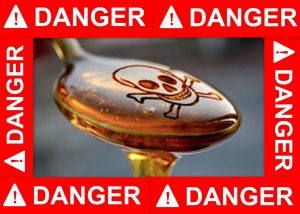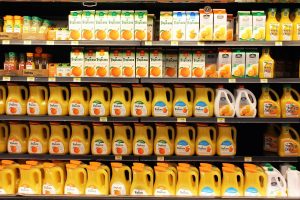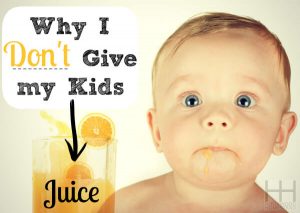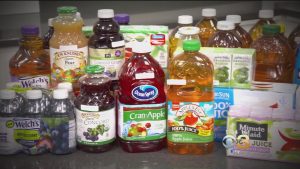The Real Dangers Of Fruit Juices. What It Means For You And Your Health!
Dangers of fruit juices are surprisingly little spoken these days. Conventional mind-set has always been that drinking pure fruit juices is healthy.
We purchase fruit juice smoothies in the store, thinking that will help our health and weight loss. And then we start our days with a large glass of OJ—for the vitamin C.
We ‘juice’ vegetables and fruit for the perfect healthy drink. We think we are giving our kids a healthy alternative by letting them drink box after box of “pure fruit juice”.
It’s Pure Fruit Juice, So It’s Good For Us, Right?
 Juice, whether it is store bought (the worst), or freshly made at home seems to be a healthy choice.
Juice, whether it is store bought (the worst), or freshly made at home seems to be a healthy choice.
But, contrary to popular thinking, juice, purchased from the store, is not far from a drink made of pure liquid sugar.
And in truth, it’s not much better than drinking a soda.
So, in spite of the fact that you or your children may be drinking a drink that says “100% pure fruit juice”, it may as well say “pure sugar”.
So you may have thought you were making a healthier choice over sodas or other processed drinks with added sugar. The plain truth is you may be drinking something equally as bad.
The sugar that comes from fruit is fructose. Same as the sugar in high fructose corn syrup.
Fructose Is Not A Healthy Sweetener, In Spite Of Its Natural Source

As you might have gathered, fructose, unless it is wrapped up in a whole fruit, is bad news for your body and your waistline.
Fructose is a non-essential dietary sugar. Fructose is actually known to be a strong contributor to obesity, type 2 diabetes, heart disease, high blood pressure.
Additionally, it is thought that fructose has some very definite and sinister ties to cancer.
And while it’s okay in fruit, because you are not getting large, concentrated quantities of it, drinking in tons of fructose in the form of fruit juice will lead you down a path of poor health.
When you drink a glass of juice, let’s say, for example, a 12 oz glass of orange juice, you hit your system with a whopping 37 grams of sugar. This sugar comes in the form of mostly fructose.
And when you have a 12 oz glass of apple juice, you are gulping down an astronomical 40g of sugar!
That’s as much as a can of soda! But wait, that’s not the worst of it—a similar sized glass of grape juice–white or red–contains almost 60g of sugar!
That’s Like Having A Can And A Half Of Soda!
Drinking a mixed juice ‘cocktail’ is no better, even if it only contains pure fruit juice.
Most often concentrated white grape juice or apple juice is added for sweetness.
That adds even more sugar to the mix! Check out the sugar grams in Tropicana Berry Punch, or Ocean Spray 100% Cranberry Juice.
It’s a massive amount of sugar! And don’t be mistaken into thinking the calories and the sugar grams, are worth the vitamins, they are not.
There Is Little Vitamin C, Antioxidants Of Anything Else Of Benefit In Bottle Fruit Juice

One of the biggest problems here is that fruit juice contains NO fiber. And of course is a very concentrated source of liquid sugar—the worst kind.
It is extremely easy to consume massive amounts of sugar from juice in a very short time.
Fructose gets sent straightaway to the liver for processing and some of it is quickly turned into fat cells.
Some of the sugar just goes right into your bloodstream and causes insulin to be released—which stores fat cells.
Dangers Of Fruit Juices: The Perfect Recipe For Quick Weight Gain
A lot of those new fat cells are stored in the liver, creating a fast track to fatty liver disease.
The rest of those fat cells turn into triglycerides, one of the precursors for heart disease. And due to the release of insulin, many of these fat cells are quickly stored in various parts of the body—i.e., belly fat, hips, thighs, etc.
This particular study shows that just one glass of grape juice a day caused insulin resistance and increased waist size in just three months.
Not only has that, but 2 servings of juice a day also doubled your chance for developing painful gout.
And The Biggest Problem With Liquid Calories Is That You Still Continue To Eat As Much Or More
They just don’t make you feel full.. On the contrary, juice just makes you want to eat more. Making sugary drinks like juice is one of the most fattening things you can put in your body.
Drink juice, eat more.

This study in children showed that the risk of obesity was increased by 60% for each daily serving of sugar-sweetened beverages.
And you are not doing your kids any favors by allowing them to drink juice to their heart’s content.
It does the same thing as a sugar-sweetened beverage.
If you want to reduce the chances that your child will be obese or develop type 2 diabetes, eliminate the juice drinks, according to this study, and this study.
One of the growing problems in the U.S. and other countries is the high rate of childhood obesity.
And one of the biggest contributors to this is sweet drinks such as juice and soda.
Kids Don’t Need To Be Sucking Down A Box Of Juice Every Time They Are Thirsty, Water Works Fine!
 Let’s chat a bit about how most juice is made. It doesn’t get squeezed or pressed straight from the farm into a carton, let me tell you.
Let’s chat a bit about how most juice is made. It doesn’t get squeezed or pressed straight from the farm into a carton, let me tell you.
Most processed juice—even 100% juice–that you buy in a store undergoes a very Unnatural process to get from the fruit to your glass, and it’s not really even 100% pure juice.
As an example, orange juice is picked from the orchards, the juice extracted out, heated and pasteurized, and then stored in gigantic vats, where the oxygen is removed so it can be stored for up to a year or more.
Dangers Of Fruit Juices: Removing The Oxygen Removes A Lot Of The Flavor…
…so big juice companies hire flavour and fragrance people to formulate “flavour packs” that make the orange juice taste like oranges again.
That is why big juice companies like Tropicana and Minute Maid, always taste exactly the same.
It is because of a flavour pack added to some virtually tasteless liquid that has been sitting in a huge tank somewhere. Yummy.
These flavour packs are made from orange by-products, although they are chemically altered and those in the juice industry will even tell you the flavour packs don’t resemble anything in nature.
Dangers Of Fruit Juices: Other Juices Are No Healthier

If they are bottled and sold in a store, they are all heated and pasteurized to kill off bacteria, yeasts, and other pathogens, thus reducing the beneficial antioxidants, enzymes, and other healthy compounds.
Then the fiber is removed as well, which further degrades the juice. Fiber slows the absorption of the sugar in the fruit, as well as containing healthy fiber to feed your gut bacteria.
Even if you think you can buy ‘healthy’ fruit juice smoothies, they are still very high in sugar, and heated and pasteurized so they can be bottled.
They Lose Most All Their Antioxidants And Vitamins From The Pasteurization Process…
…along with just the amount of time they sit on a store shelf.
They usually add ‘filler’ high sugar juices like apple juice and grape juice to make them taste better.
Most often, even if it is labelled as a smoothie, it may be more fruit juice (read “high sugar”) than actual whole fruit and fibre.
So basically, you get a lot of sugar and a little flavour and not much more in a so-called ‘healthy’ smoothie you buy from the store.
All in all, if you are thirsty, or your kids are thirsty, drink water.
You can make your own flavored waters by using spring water, chopping up an orange or dropping in a few raspberries, or even slicing up a cucumber to give the water some added flavour.
Try adding a squeeze of a real orange slice to your sparkling water or even a lemon or lime wedge.

And if you just can’t do without lots of flavour, try drinking kombucha tea.
This fermented tea is reasonably low in sugar (about 1/8th the amount of sugar of juice). But is full of gut-healing probiotics, cancer-fighting compounds, and a good dose of healthy phytochemicals.
Kombucha is gaining in popularity, so most stores sell lots of different flavours to suit every taste.
Just watch the sugar content. Why? Because while most of the sugar in these drinks has been gobbled up by the fermentation process, some could still have some added sugar.
However, most brands seem to have anywhere from 2 grams to 8 grams of sugar in 1 cup of kombucha…
…Which Makes It Very Low In Sugar Compared To A Glass Of Juice Or Soda
In the long run, you may be shocked at how many sugar calories you and your kids may have been drinking.
You and your kids will be far better off if you steer clear of the juices and sugary drinks.
The popularity of kombucha is growing very fast. And it’s not uncommon to find kombucha even at many corner stores and gas stations these days.